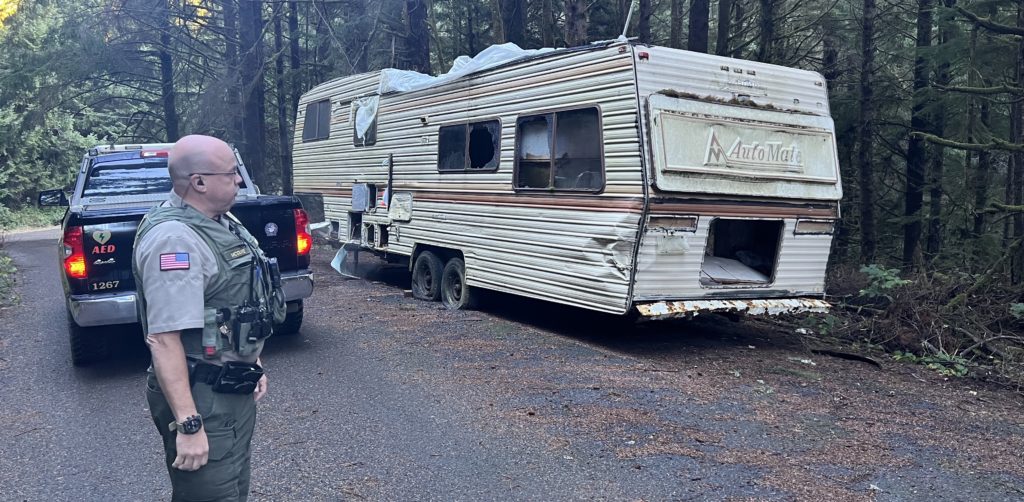
By QUINTON SMITH/YachatsNews
The massive fifth-wheel camper has been parked on Dick’s Fork Road between Yachats and Waldport since July, when the U.S. Forest Service posted it for removal.
It’s still there.
On Oct. 12, a Lincoln County Sheriff’s deputy posted a removal notice on an abandoned travel trailer parked along U.S. Highway 101 overlooking Alsea Bay in Waldport. Two days later the Oregon Department of Transportation did the same thing.
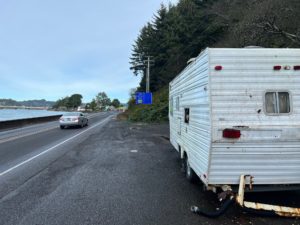
After complaints from the city of Waldport, the public, and unsuccessfully trying to get tow and disposal companies in Lincoln County to deal with it, ODOT finally negotiated with an Albany company to take it away — nearly two months later.
The cost to tow it? $7,000.
As anyone who has driven around Lincoln County knows – whether on some backwoods road or Highway 101 – abandoned trailers or RVs aren’t just a Portland problem. It may be much smaller in scale, but state and federal agencies are unprepared and under-funded to deal with the problem. But last week, Lincoln County commissioners approved a $500,000 pilot program to see if the county can coordinate a response and deal with the problem.
There are 12 abandoned travel trailers or RVs on U.S. Forest Service roads just in the Central Coast Ranger district.
“There’s no one place where people are dumping these,” says Bruce McGuire, the sheriff’s deputy assigned to forest patrols. “It’s countywide. It’s random. They’re trying to hide things in a lot of remote places.”
And it’s not just the easy-to-blame homeless that are walking away from RVs or trailers, say law enforcement and sanitation officials, but also people who finally realize their property is being overwhelmed by unregistered vehicles. So some simply haul them to some remote site and leave them.
That’s behind the $500,000 program approved by county commissioners last week — to not only remove abandoned RVs and trailers from along roads or in parks, but to identify people with non-functioning RVs or trailers still on their property and work out a disposal plan before they become a bigger, more expensive problem.
“This is an egregious problem and we decided to dig into our budget to attack it,” said Paul Seitz, manager of the Lincoln County Solid Waste District, who came up with the program. “Hopefully we’ll see a difference.”
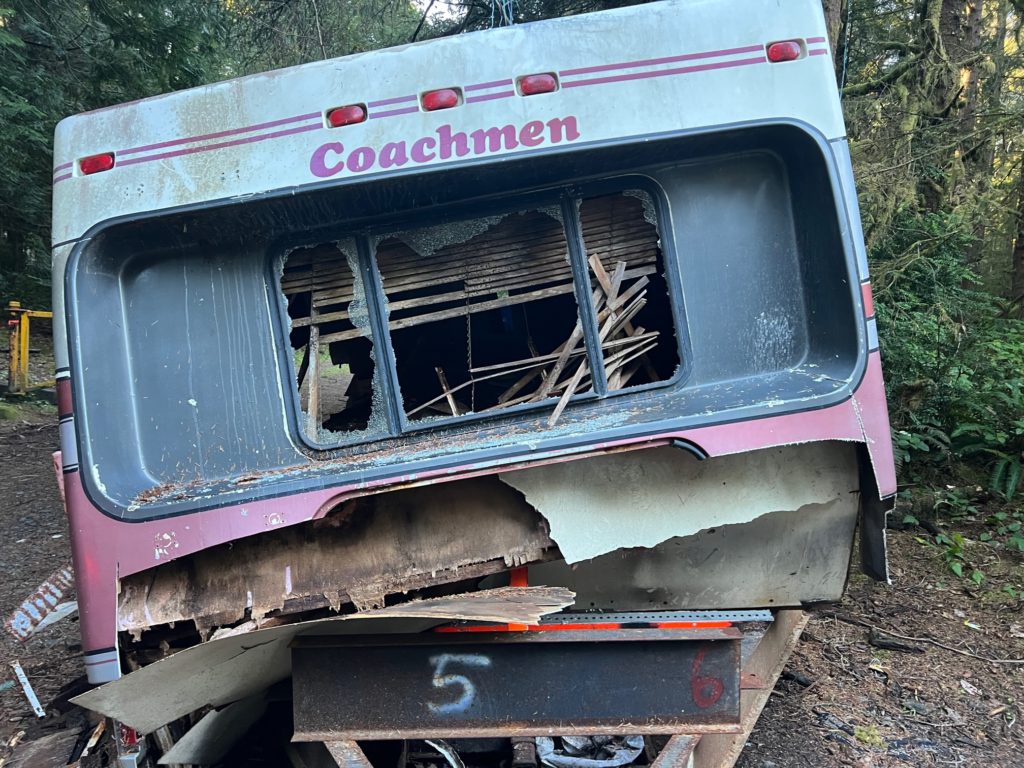
Few resources
Here’s how local, state and federal agencies try to deal with the issue of abandoned trailers and RVs. Warning — it’s complicated.
Oregon Department of Transportation
Once ODOT is notified of what appears to be an abandoned vehicle on a state highway right of way, it tags the vehicle with a sticker giving the owner 24 hours to move it. If it’s not moved, then the agency begins calling tow companies to remove it. The agency started a pilot program that pays companies $3,000 to haul them away – but because of rising disposal costs “participation in the program isn’t as high as we’d hoped,” said agency spokeswoman Angela Beers Seydel.
If – as in the case of the Waldport travel trailer and an RV abandoned two miles south about the same time – no local tow company wants the job, then ODOT begins calling companies in the Willamette Valley to see if they’re interested. Finally, it got AA Towing of Albany to take both away – for $7,000 each.
The money comes out of ODOT’s maintenance budget, Beers Seydel said.
The tow company is then responsible for finding the registered owner – if there is one – and billing them for the tow, storage and any disposal costs.
The trouble is, local and state officials say, is that most abandoned vehicles haven’t been registered in years – and there is no requirement to register travel trailers or system to track them.
Lincoln County
When the sheriff’s office is notified of a possible abandoned vehicle on a county road, a deputy tags it to let the owner know it may be removed after 72 hours. If the owner doesn’t move it, then the county also begins calling tow companies.

“It’s the old RVs that really haunt us,” says Seitz. “By the time you get to an abandoned RV they are not mobile … and there’s no money in recycling them or money to remove them.”
If an RV or trailer is older than 2004 it has to be tested on site for asbestos in order to keep the carcinogenic mineral out of landfills. If asbestos is found, then it has to be removed and bagged where the vehicle sits – a costly and time-consuming job.
Garbage transfer stations in Lincoln County do not handle asbestos, so anything with it has to be put into a sealed drop box and hauled to a landfill near Corvallis. Disposal of a vehicle with asbestos can cost $15,000, said Seitz.
Of the three disposal companies in the county, only Dahl Disposal in Toledo has a state permit to dismantle vehicles with a motor or transmission.
U.S. Forest Service
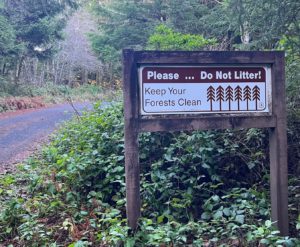
The Forest Service’s procedure is similar to Lincoln County’s – except it hasn’t had the money or focus to deal with them and has had a hard time finding a tow company willing to haul them away. While vehicles abandoned on federal land have always been an issue “there has been a significant increase in RVs being dumped within the last two years,” said Kailey Guerrant, acting ranger for the Central Coast district in Waldport.
The Siuslaw forest recently allocated $55,000 to pay for vehicle removal across the seven counties it covers, ranging from $15,000 directed to areas of Lincoln County to $5,000 in Benton County. It won’t be nearly enough, Guerrant admits.
“Past tows have averaged $4,000 per vehicle but can vary depending on the size, condition and location of the vehicle and the hazardous materials associated with it,” Guerrant said.
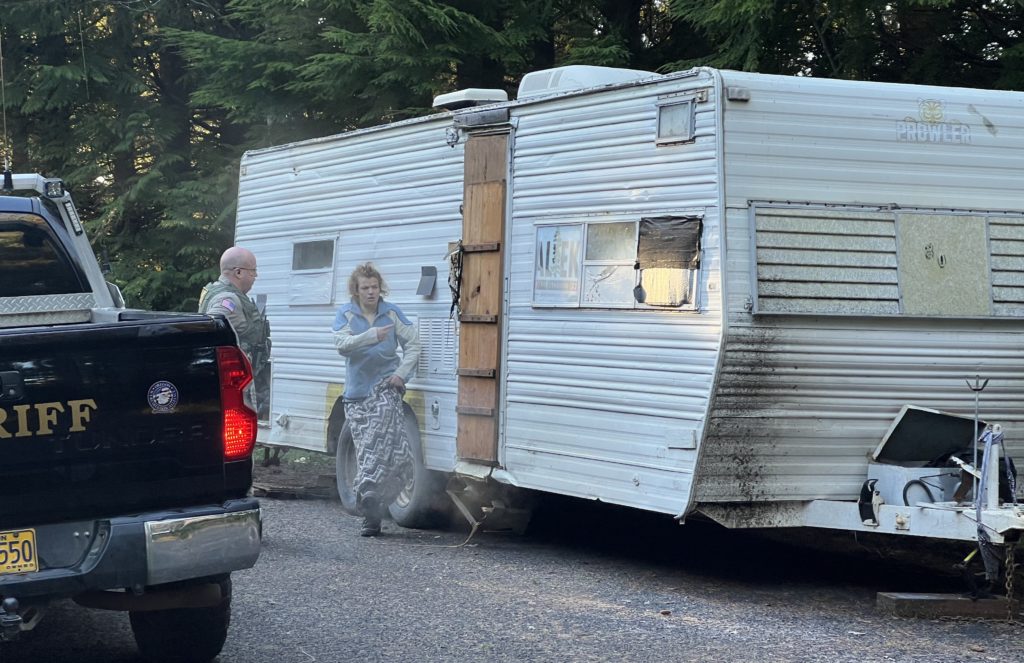
County’s new $500,000 program
There’s not a lot of ideas – or money – for dealing with a growing and expensive issue. There are some thoughts – and one action last week to help.
One is to create or tighten state rules on licensing travel trailers so their ownership can better be tracked. Another is to levy a fee on the purchase of each new RV or trailer that goes into a statewide fund to help pay for cleanups – similar to what is now done for electronics.
But the best idea so far has come from Seitz.
Last week he got county commissioners’ approval to use $500,000 from the waste district’s contingency fund to establish a pilot program for RV removal. It would be used in five ways:
- Remove abandoned RVs and trailers from county parks and roads not belonging to the county; estimated cost $125,000;
- Provide $20,000 credit to the seven cities in the county to identify RVs for removal and have the county pay for removal;
- Remove RVs from county maintained road rights-of-ways; estimated cost $75,000;
- Enhance the existing forest enforcement program to help landowners with abandoned vehicles and asbestos abatement; estimated cost $50,000; and
- Work with property owners to remove abandoned RVs and trailers from their property in exchange for an agreement to not move more vehicles onto the property for five years; estimated cost $125,000. “The whole idea of the program is the property owner agreed not to fill up his property with new junk for five years,” Seitz told YachatsNews.
The solid waste district also wants to hire a contractor who could respond quickly to tagged RVs or trailers and get them removed before they attract other vehicles, trash – or are set on fire as is often the case now.
Seitz and county administrator Tim Johnson told commissioners that at $10,000 a removal, the program should be able to remove and properly dispose of 50 abandoned RVs.
That’s a “significant change,” said Johnson, who later added that the county will begin seeking other sources of funds to keep the program going after its first year.
Seitz is also encouraged that the sheriff’s office has assigned McGuire as its forest deputy – a position paid for by the solid waste district and forest landowners in the county – but had been vacant for most of the past 12 months because of staffing issues.
McGuire is creating a countywide map that any agency can access to pinpoint each abandoned vehicle – and so they can also tell the public if they know of the site when they call to report a problem.
But the sticking point will always be money.
“The key point is where is this money coming from,” Seitz said. “The answer is that no one has this in their budget now. No one has the $5,000 to $10,000 to deal with each one of these.”
McGuire deals with the issue almost daily.
“It’s frustrating,” he said “It all costs money. And in the end, it costs everyone.”
- Quinton Smith is the editor of YachatsNews.com and can be reached at YachatsNews@gmail.com



Great thanks for this article and to the county commissioners and all the agencies not ignoring the growing problem. Praise for working together. As hikers of the beautiful creation in Siuslaw Forestry Road, we’ve been abhorred each time a new RV was dumped. The Forest Service explained some of the problems and expense of disposal and it seemed hopeless. Shame on those who dump — may they be caught and made to pay or go pick up litter like we do so frequently.
I agree! Our forests are so beautiful, it’s a shame people don’t appreciate our area, but use it as a dump.
Thank you!!
Yes, our forests are beautiful and often those who dump the RVs are dumping their last hope for a place to live. Homelessness is a national problem often brought on by ever increasing housing rental prices. If we address affordable housing some of this problem will go away.
So true!
This has nothing to do with affordable housing. It is a drug addiction and mental illness problem.
Oh really,? I know multiple people that are not on drugs, that have lost there homes due too rent being doubled and tripled in the last couple years, that live in rvs, campers and cars, in my area
I have a Idea as to how that might be possible Empowering the handicapped to do disaster relief and low cost housing as a group the power given is multiplied and relief given to everyone
We as community need to work together to clean our forest from dumping trash. Also, restoration of the ecosystems that naturally keep it beautiful.
Myself, I have cleaned up many messy trashed out areas of Josephine County. Also, collected too much. For free on my time. I would gladly take $5,000 to tow it away or break it down.
I see campground owners sneak out at night and drop off trailers that the people cannot pay the rent on. It’s becoming very difficult to find a place for rent that’s decent.
Addressing the funds to remove these trailers and motor homes, how about a disposal fee upon purchase, depending on size from $3,000 to $7,000. Money will go to state agencies to offset costs for disposal of these dilapidated abandoned trailers and motor homes.
Why should I have to prepay for someone else’s problem. How about teaching people to be grown adults and that actions have consequences. I have owned many RVs, boats, vehicles and trailers. And not ONCE have I ever abandoned them.
Its sad to see and read about all the illegal abandonments taking place. Another concern is the RV’s just pulling over on the side of the road for a few days without having to pay any fees. If you drive by in early evenings you’ll see the grey water hoses come out and pump their crap onto the cliffs and into our beaches/oceans. Moolak beach wayside is notorious for being the RV campground with a million dollar views without paying anything. Nobody seems to even care to push these freeloaders along. The county needs to step up and take ownership of this. Once word gets out, you’ll see less abandonments and roadside camping.
A heartless arrogant comment. I am a 70 year old retired ICU nurse who went through a horrible divorce and was taken advantage of by a divorce lawyer. I have spent the majority of my life helping people. I am not a freeloader. The high cost of housing has been unspoken in this article. Moolack Beach is beautiful created for everyone not just the rich. I never litter; I recycle.
Replying to Marjorie Ackerman: So are you saying you are one of the people parking at Moolack Beach and running your gray water hose down the cliff? Otherwise, what you posted seems to have absolutely nothing to do with the problem being discussed.
She is saying that the pandemic has been a very impactive ordeal for alot of Oregonians. The loss of family due to death, the evictions currently taking place because of rent hikes and any additional funding being at an end. The Oregon Covid 19 morartium on housing protections has ended. Landlords already compensated by landlord guarantees by federal government and rental assistance being awarded to cover months of rent for those landlords. Also being given additional tax credits and deductions. Yet still have raised rents to levels known to be unaffordable and forced mother and children onto the streets and in cars for shelter. Has left some jobless, homeless and without the family they could turn to. Without the ability to Covid period time access any of those resources due to no in person availability. Are down so far now they can’t get up . And these trailers during the wind rain and very low temperatures as of late the only shelter. Seriously the lack of compassion that people have, or inability to put themselves in others shoes, before passing judgement is ignorant at best, in my opinion. Having the ability to fully understand the process that lead to the situation. Now for these less fortunate people. Is a case per case basis and not every situation is ever the same for the different individuals circumstances and how it progressed to the end result now. No I don’t say that littering is in any way a allowable practice to them. Or that leaving the trailers in the woods is a proper thing. I’m just pointing out the extreme conditions and weather the Oregon coast has in winter. The fact that these trailers no longer wanted are given to most of these people by compassionate and outreach from citizens that can think in those “what if it was me in this position” and act to prevent suffering of the people in their community. Children often times are a part of this equation, and can drive an effort to provide these trailers to women who have no where else to go. The coast doesn’t have the resources or the community outreach and shelters available to these people either. This isn’t gonna going away any time soon as rent hikes in Oregon with an over 14% allowed rise to rent in 2023 the last years rent allowed rate and the declining of available jobs especially on the coast. What to do? How can we change laws and legislation to make a way to help lower-income populations a chance to get back up.
I do not own a RV but I love Moolack Beach. I have been in Oregon for 2 years retiring from NC. I find many people who judge others not knowing about their hardships. Selfish arrogance will get you nowhere.
But quite a few people do: perhaps if you’re staying in the Moolack Beach area, you were able to help wth the recent trash pickup along 101 near Moolack beach? I helped last year and found the greatest amount of trash, underneath trees, in the salal & brush, in the parking areas on the west side of the highway above the Moolack beach area, total was probably around 50-60 lbs (that’s just what I found), and that included a large black trash bag full of fast food & other trash that someone(s) had abandoned underneath some brush/salal. Animals had gotten at it/ripped some of the bag’s plastic so I had to rebag it all before I could move/drag that bag of trash to a place next to the highway where ODOT staff would pick it. What I wasn’t able to move was a large futon couch someone had abandoned. Whoever had done it seems to have been using it as a place to rest/sleep while viewing the ocean–from on top of an unstable part of the beach bluff. The futon couch was starting its slow slide down to the beach. I couldn’t shift or drag it, way too heavy for me. Told the Surfriders Cleanup leader, all she could do was notify ODOT that something large needed to be picked up & hope they took/had the time to pick it up.
Some people living in RVs are fine, but some don’t want to use the gas needed to take their RVs to somewhere they can legally dump their “black water”, instead they release it wherever they are. If that happens in Moolack Beach, some of whatever pollutants, bacteria, viral particles are in the “black water” (i.e, come from the RV storage tank for the toilet) will percolate down into the sandy rock strata & end up on the beach, from there into the ocean & quite possibly make some surfers, people who wade in the ocean, (and possibly other mammals or birds) and for all I know, eventually find their way into fish in the area. Not a healthy outcome.
You tell it like it is. That was a heartless mean arrogant comment to say. Not everyone is rich. Sounds to me that while you, Marjorie Ackerman, were not rich in money matters You are rich in heart. God bless you. You’re right, I was thinking about families and single persons. Working two or even three jobs that aren’t “ rich” trying to keep a roof over their heads to survive.
As a kid, my parents would pull off at the wide spots in the roads to prepare us kids (5 of us). They were pulling a 15 foot little travel trailer and these pullouts were great for feeding hungry kids and letting us work off energy. These are some of my fondest childhood memories.
Also, on a trip to Wenatchee once in my husband’s’65 Dodge van, we pulled over into a wide spot in the road to get some sleep. We were very tired and sleeping in the modified van was safer than trying to continue on. My husband was very uncomfortable doing this but I told him it would be fine, and if we got a knock on the door to move along, well then we at least got a little bit of sleep. We got up early to be on our way and discovered there was a motor home also parked in the pullout.
I do not advocate for dumping any of the RV tanks but an over night stay in a pullout is better than driving on. I think that is why you see the semi trucks stopped here and there-they need their required downtime.
And finally, I worked for a federal agency and had to deal with garbage, above ground pools and RVs under 230k to 500k transmission lines and/or blocking access roads. I was able to get info on the owner from the vin number and would send them a letter I was going to have it towed. Half the time they had sold it and the new owner hadn’t transferred the vehicle or RV. Towards the end of my career the tow companies were getting more difficult to find for removal and we had a culture change at my agency—-why are we doing the removal anyway. It’s not my/our job! I don’t know what is going on there now but this cultural change included getting over 40 contractors and federal employees to leave -retire/quit because they wanted senior staff gone. We wanted to do it right including getting stuff removed from the rights-of-way and other “outdated “ ideals.
Dumping is serious business and costly.
I would never abandon a trailer anywhere but basic camping fees are getting expensive. Many as myself now “boondock.” Here is why. To reserve a place to camp for 3 days. Check in time not before 2 pm. Well that day is basicly shot down. Second day all yours. Enjoy. Third day be out by 10 a.m.! Really? Yes! So there really isn’t a 3rd day to enjoy at all but you are paying for it. Thats awful. So you really only have 1 day out of 3 to go exploring or other fun things to do.
Maybe some of these re-useable rvs can be used as homeless shelters?
I agree!
I agree they need some place to sleep other than on sidewalks. Help the homeless in some way. We need to help everyone and the homeless get bad reputation because they have no place to go. Let’s start by making some place safe for them. Housing costs is out of control not many can afford rent.
I was thinking the same thing! Or, if any of them are in livable shape, how about a program for people to be able to get help with a tow fee into a site for them. Some “homeless” that can’t afford an apartment, may be able to pay a space fee and have a home?
Half of them are owned by heroin addicts, who don’t do anything but smoke fentanyl all day and make money by selling their EBT food money and suboxone strips, then they shoplift food and steal everybody’s stuff so they can trade it to drug dealers for more pills.
“Half of them are owned by heroin addicts who sit around smoking Fentanyl all day”
Smoking Fentanyl is fatal every time. Every time. Only a few grains of it is deadly. Grains, not grams.
As far as the “Half of them are heroin addicts…” part goes, please cite some actual reliable, valid, academic studies that show that. Otherwise, you’re just blowing smoke.
Same thing happened with the fifth of my travel trailer on Good Friday 2022. The police recovered it only a few weeks ago. It was so contaminated with needles, drug paraphernalia, and human excrement that it had to be completely destroyed. I didn’t ask these homeless criminals to steal my trailer nor did I ask for them to trash it, but who gets to pick up the tab for all their illegal activities? Now when I sell my home, I’ll have to stay in a motel or camp in a tent until I can buy a new truck and trailer. Shame on these people for being so thoughtless, cruel, and stupid. I worked hard all my life simply to be stolen from and frantically trying to come up with solutions for my transition to RV living. I pray for the souls of these people and their lives. I’m leaving as soon as I possibly can just to get away from all this. While my heart goes out to the truly homeless, these drugged up criminals need to be dealt with as soon as possible.
My thoughts exactly…
Great article. I have wondered why it takes so long for these abandoned vehicles to be dealt with.
Our 4×4 club (Caveman 4×4) in Grants Pass has been removing trash from mountain roads in Southern Oregon for a few years now. We also do recovery clinics on abandoned vehicles that are found on and off the dirt roads. We need help! We can’t come close to keeping up with the trash. We clean an area up but, within a short amount of time these areas are filled with trash again. As far as RV’s go, we don’t have a place to haul these to. Growing up in Grants Pass it really saddens me to see this litter. We do what we can but our club efforts are not enough. We sometimes get sponsors to pay for the dump fees but we need help. Maybe if the dump was free we might eliminate some of the problems but a certain “grade” of people wouldn’t even use the dump if it was free. So so sad.
Hey, my name is Guy, and I’m currently homeless, living in an abandoned building. I’m curious to know what you do with any of the RVs that you collect? Are any of them livable? If so, if I was able to pick it up, how low would you be willing to go on price? I only work a couple days a week doing trash pickup for a small waste disposal company, but maybe we could work out a payment plan or something. Please let me know if there is anything possible you can do. Thank you.
Don’t tow, but smash and crush and load into dump trailers to be incinerated and permanently destroyed. These zombie trailers and motor homes for the most part are not licensed or insured and thus are illegal to be on the roads at all. I think all of these RVs should also be destroyed. Furthermore, if they can track back the person that sold these RVs that aren’t legal to be on the highway, that person should be charged with the removal costs that the county spends cleaning up a mess that they enabled.
They might have been in better condition, legal to be on the road, when they were last sold. You can’t hold a previous owner responsible for the actions of a current owner.
If there was a place that would take RVs that no longer ran or had problems, people wouldn’t dump them. You noticed tow companies wouldn’t do it? Cause there’s no place reasonably close to haul them. Need a place(s) for people to be able to take them or have towed to dispose of them. There’s not and so they are dumped, which is even more costly.
So how do you even get 50 cents out of the type of person that left the RV there. Be realistic.
I hate littering with a passion. Garbage has it’s place and that isn’t on the roadside.
That being said, this should be a lesson on government regulation. No one who owns these wants to dispose of them properly because the government regulations make it cost prohibitive to do so. The tow companies don’t want to touch them because government regulations make it cost prohibitive to do so. So what you’re left with are owners abandoning them on the side of the road.
I read another comment from someone that suggested a $7-15k disposal fee be tacked on to the purchase price. That person hasn’t looked into the price of RV’s lately. They’re already expensive. That added cost would kill the RV manufacturing and sales industries resulting in a lot of lost jobs.
Less regulation will have a better outcome.
why aren’t the last registered owners located?
I live in a travel trailer as housing costs are so expensive. I live on my friends property with their permission of course. My Rv is a newer one. I get a deputy to tell my friends that I can’t be living in my RV as it’s against county code. I spoke with another deputy at my daughter’s school he told me to go home and look up Martin vs Boise. I did I was shocked to see that they cannot enforce people living in their Rv on private property but can on public property. I moved my trailer to another property as my family said “Hey, come here as we want to help you get on your feet.” Come to find once again the deputy told me that I am breaking county code. I told him about this ruling and that I am able to stay until the Ninth district court says I can’t. Which means the county can’t enforce it as long the county cannot have enough homeless beds to get the homeless off the streets. They have grant money that they are sitting on they just need to put it to work now.
How many of these trailers have asbestos? Where is it located? Throughout the vehicle? As insulation, mainly in the roof? Was this practice halted (by government regulation, perhaps) after a certain date or did compliance vary by make or model?
Even if a certain percentage of these abandoned vehicles were deemed safe/healthy enough for rehabbing back into human
accommodations there would still be towing arrangements and costs required to get them to the homeless (also vehicle-less persons).
Nobody wants encampments or recycled RV parks or landfills or asbestos collection facilities near them, anyhow, regardless of how “rich” they are. But whose voice gets or should get heard?
The article specifically states that RVs and trailers built before 2004 are likely to be riddled with asbestos.
Asbestos? These ain’t decommissioned naval vessels! They are plastic, wood, aluminium, and fiberglass. The county I live in considers dead trees and brush “hazardous waste” and needs “special care” for proper disposal. What a wonderful world
Well. I read all the comments and must reply to all.
Nobody really gets it. Until we urge our legislators to change the laws, this problem will only increase, and continue forever. County, state and federal programs are nothing but “touchy feely” band aids on a real problem.
Typing on this phone is difficult, so I may be brief here.
Change the laws such that start-up entrepreneurial companies can tow and dismantle them, sell the useable parts like stoves, refrigerators and heaters. With the changed lenient laws, the company could bag up the ceiling, floor and insulation material and take it to one of the dumps that are approved to receive it.
A win, win for all. Boots the economy, creates jobs and declutters our forests. All the other “programs” are nice fluff, but will not solve the problem.
Get real, do the research and call your legislators. I did.
Side note: Land fills that take asbestos material in black plastic bags do exactly what they do with regular trash. They bury it. They just do it in a separate, safe area, marked as such preventing future use of that small area.
Give it some thought, people. Make the call.
I think we are looking at this wrong. Our government has made us dependent on them for our lively hood, with tax payers picking up the tab.
1) we should not be handing money out to person’s who are not employed. Everyone is able to work one way or another to help each other out.
2) if you truly have issues and are not able to work, then we need to care for you.
a) either in an institution for mental issues
b) or for physical issues
These would be the only two acceptable reasons for the American tax dollars are to be responsible for yo health and wellbeing. Otherwise everyone is able to do something and receive vouchers from the government to help provide you with food and living quarters. Yes some are disabled, but not to the point they can’t do something, pick up garbage with a poker stick and put in a bag, help do paperwork to help other find volunteer wr to get vouchers to survive. My grandfather helped build schools, roads, clean trails in forest reserves for others to enjoy, received payment, of very small amount, but it helped him provide for his family that lived in a tent.
There use to be CC camps for men who couldn’t find work that would do government, cleaning up areas to help produce farmlands. Why can’t our government utilize past history ways of doing things instead of just giving out money so freely. The government is wanting us to become dependent on them instead of helping us learn trades that can help each other. History repeats itself all the time. Let’s learn from our past, rework it to fit our present situation and go forward. Let the homeless go back to work and help resolve our problems. By helping them develop work ethic, and realizing they can help themselves while helping others, instead of just giving them a reward for being homeless. If we can utilize our problems to resolve a problem isn’t that worth our tax dollars instead of rewarding someone for doing nothing ad being a burden to the next generation. Where is or Government butter and cheese’s, if these generation can not and does not want to help themselves it s up to us to help them learn they can do something, if nothing more than picking up trash. We need to stop teaching them it’s k to be a burden and have nothing to do but destroy their lives with their addictions and be a burden to society. Our food stas and fee money they receive is not the answers. IT IS NOT WORKING. It is getting worse. We must learn from our past o be destroyed in the future.
How about opening it up to people who would like to salvage them. I’ve seen a few that could have been saved, and repurposed. I would like to build a recreation camper, but dont have a huge budget.
I worked for Code Enforcement in California. When people register their vehicles the state would collect $1 for passenger vehicles and $2 for commercial vehicles to help cover abandoned vehicles. The county had to set up a Abandoned vehicle joint powers authority with the cities within the county. The state would disburse the money collected based on a formula. 50 % of the money was based on population and the other 50% was based on the number of vehicles towed in the prior reporting period. It didn’t cover everything but it did help offset the nuisance budget. The other part of the equation was making contracts with tow companies. That means passenger vehicles get towed at a date of x $ and rv/ motor homes get towed at a rate of x $.. I am not sure if Oregon has something similar. But it would be worth all the work to get this on a ballot. Before people say they don’t want to pay to tow other people’s stuff. You already are. This just manages the amount.